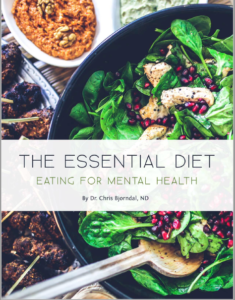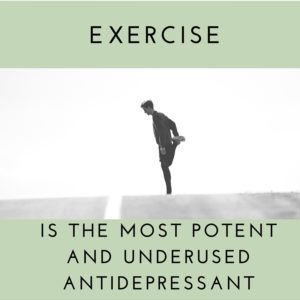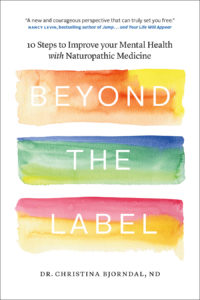10 steps to improve your mental health with Dr. Chris Bjorndal, ND
10 Steps to Improve Your Mental Health with Naturopathic Medicine
For many, mental illness is fraught with many unanswerable questions. In my case, the question “Why me?” is one I have asked myself over and over. This question has become the central quest of my life’s work as a Naturopathic Doctor and as someone with lived experience with depression (suicide survivor), anxiety, bulimia and bipolar disorder type 1. There is a silent epidemic going on with rising rates of suicide. Mental illness affects all of us regardless of race, gender, societal status, wealth or age.
Why does mental illness happen?
Through decades of experience of working with my own struggles, as well as, with my patients, I have come to recognize the importance of addressing 10 key areas when pursuing mental wellness:
- Diet
- Sleep
- Exercise
- Stress management
- Thoughts
- Emotions
- Behaviours vs. Reactions
- Exposure to Environmental Toxins
- Spirituality
- Love and compassion for yourself and others
Based on these areas I have developed the 10 steps to improve your mental health and mental wellness.
1.) Diet
Conditions like depression and anxiety are commonly seen as a neurotransmitter deficiency. Yet, taking a drug doesn’t fix the root cause of why these chemicals are out of balance. Your body may not be supporting the pathway to make healthy amounts of neurotransmitters in the first place because it may be missing the building blocks or other key biochemical co-factors.

If your diet is poor (highly processed and full of caffeine and sugar) you simply cannot make enough serotonin or other neurotransmitters to feel balanced. Environmental toxins (heavy metals, pesticides and endocrine disruptors) also block nutrient absorption. Key pathways in the brain require proper amounts of essential nutrients. Nutrients such as, tryptophan, vitamin C, B6, B3, iron, magnesium, riboflavin, folate, and zinc.
While diet components are extremely important, so is the eating environment. Creating habits like cooking at home, eating with others, chewing thoroughly, and eating mindfully will make a big difference. Blood sugar levels also affect mood significantly. It is important to eat regularly. There is so much to say about diet that I have written a guide book on this subject: The Essential Diet: Eating for Mental Health.
2.) Sleep
A consistent and regular sleep routine is critical to our mental health. It allows us to rest, detoxify and process what happens to us during the day. Being deprived of sleep decreases energy, increases stress, cortisol, and emotional reactivity, suppresses the immune system, and promotes weight gain. More importantly, doctors now recognize lack of sleep as a direct contributory factor for many chronic and acute mental health conditions like depression, anxiety and episodes of psychosis.
It’s not just about quantity; it’s about quality.
Are you sleeping through the night or waking several times? Are you stressed and grinding your teeth or having terrible dreams? Stress increases cortisol in your body, which decreases your body’s ability to produce the sleep-inducing hormone melatonin, making it harder to get a good nights sleep.
In the end, getting a good sleep is multi-factorial and requires you to work with your lifestyle, thoughts, eating and exercising habits, hormones, and coping mechanisms for stress. Supplements and medications can only take you so far; getting to the root cause of poor sleep is the goal.
3.) Exercise
I often say that exercise is the most under-prescribed antidepressant treatment available. A 2016 meta-analysis focusing on regular aerobic exercise as a treatment for depression shows it is statistically equal to antidepressants as treatment, without the adverse effects. It is also effective in schizophrenia, bipolar disorder, ADHD, and OCD. It’s not just aerobic exercise that’s effective; studies have also shown the psychological benefit of other types of activity.
Having a regular routine of weight lifting, playing sports and/or doing yoga can improve mood and decrease anxiety and depression scores just as well as rigorous, high-intensity running can.
The psychological benefits of exercise are even greater when we do it with others, and especially beneficial when we exercise outdoors. Joining a community sports team that gets you outside and interacting with others regularly is a big step toward improving your mental health.
4.) Stress management
Stress is a psychological experience of feeling like your resources (internal or external) are almost exhausted (or are fully used up), and you are struggling to cope with demands of life.
No matter what the stressful event is, if the mind experiences psychological stress, the body experiences physiological stress. This physiological stress is an ancient survival mechanism built in to our bodies to help us flee harmful situations, but today’s world, it’s less helpful.
This“fight-or-flight” reactivity, suppresses the immune system, halts digestion, affects hormone production which affects our sleep and impacts adrenal energy stores. Long-term, this can lead to adrenal exhaustion, muscle tension, digestive complaints, depression, anxiety, and insomnia.
The first step in stress management is becoming aware of triggers.
With awareness, you can then work to reduce or eliminate them. If you can’t reduce stressors, you must learn to manage your reactivity given your current life situation. Working with psychotherapeutic techniques, such as the seven Rs of working with problematic thoughts (that I discuss in my book: Beyond the Label) or systematic relaxation tools you can manage your response to stress.
5.) Exposure to Environmental Toxins
In today’s day-today life, chemicals are everywhere. It’s the sad truth that regulatory groups just don’t protect us enough from so many harmful environmental toxins. Unfortunately these insidious chemicals contribute to many chronic health conditions, including mental illness.
To understand your toxin load, take our Environmental Quiz which considers exposure you might have to plastics, pesticides, non-stick pans, microwaves, extended cell phone use, artificial colouring and fragrance, make-up and personal care products, genetically modified foods, antibacterial soap, alcohol and pharmaceuticals. Also, what is the air and water quality like in your hometown and do you filter either?
With so many sources it’s easy to feel overwhelmed. The point is not to burden you with the task of immediately changing everything. Start to become familiar with your most frequent and intense exposures and work to reduce them. Be aware of initiatives like the Environmental Working Groups’ list of the most heavily pesticide-sprayed foods (The Dirty Dozen) and the least sprayed foods (Clean Fifteen), and apps like Think Dirty® that lets you scan household products to discover their toxin content and find healthier alternatives.
6.) Thoughts
Every thought we think isn’t necessarily true; thoughts are simply ideas that exist in our heads. However, some thoughts are so powerful that we take them to be fact. Sometimes old wounds and childhood conditioning come out in thoughts like “I’m not good enough”, “I can’t do this”, and “I’m unlovable”.
Each time we have negative thoughts like this, we naturally have emotional reactions to them as if they were true. We may feel hurt, saddened, defeated, demoralized, depressed, and suicidal. These emotions then can reinforce the thoughts making them feel very real. It is as if the emotions are evidence that the thoughts are true.
When this spiral happens, the work that needs to be done is breaking the thought-emotion cycl e. Using a stepwise practice you can learn to widen the space between thoughts and emotions and learn to separate fact from fiction. You will learn that thoughts and the emotional reaction to thoughts don’t have to run your life. You can learn a more balanced approach to thinking. This practice uses a cognitive model to recognize and work with distorted thought patterns, as well as body-focusing techniques and breathing to harness the parasympathetic nervous system and modulate the physiological stress response.
e. Using a stepwise practice you can learn to widen the space between thoughts and emotions and learn to separate fact from fiction. You will learn that thoughts and the emotional reaction to thoughts don’t have to run your life. You can learn a more balanced approach to thinking. This practice uses a cognitive model to recognize and work with distorted thought patterns, as well as body-focusing techniques and breathing to harness the parasympathetic nervous system and modulate the physiological stress response.
7.) Emotions
For some, emotions can be elusive and hard to pinpoint, and for others they can be clear, overwhelming and incessant. As well, they can be different to you at different times. The emotional work I do with my patients follows a process of understanding what one is feeling in a very present, honest way, then working towards letting go of resistance and accepting one’s emotions.
Skills I teach along the way are recognizing one’s own emotional sensitivity level, learning to set healthy boundaries, and mindfulness of the present moment. This work flows back and forth with the work on thoughts, behaviors and emotional reactivity.
8.) Behaviors versus Reactions
Often in mental health conditions there are cycles of behaviors that reinforce the illness: isolating, sleeping too much or too little, blowing up or shutting down emotionally, eating too much or too little, etc. To address this, following closely behind the work on thoughts and emotions, comes the practice of behavioral change.
As one learns to lengthen the time between thoughts and reactions, there grows a window of opportunity for one to act in a different manner than simply reacting. We can actually learn to choose a healthy behavior, as opposed to immediately reacting in a protective manner.
An example is if we have a negative thought, we have the ability to pause and say to ourselves, “I am thinking a negative thought”. By doing so, we widen the gap between thought and emotion, and we have practiced recognizing exactly what the emotion is. With this, we have the opportunity to choose our response from a calm place. We can choose healthy and positive actions that do not reinforce the negative thoughts or feelings that are present with mental illness. We choose actions that dislodge negative cycles of thought and emotion and lift us out of depression, anxiety and other psychological spirals.
9.) Spirituality
Mental health is often viewed as a biochemical imbalance. I have made my life’s work an exploration of the other factors that contribute to mental health concerns beyond biochemistry, including psychology, trauma, physiology and environment, but there is another factor to explore: the spiritual aspect of mental health. Here I define spirituality as believing in, or being connected to, a power greater than yourself.
My view is that mental illness is a way by which our spirit is trying to get our attention because some aspect of our lives (such as school, work or a relationship) is not moving in concert with our spirit. By looking at ourselves and taking the time to be silent, very present, talk to others and open up about what we are feeling, we can address the underlying root of depression, anxiety, addiction, bipolar disorder, and other problems that can lie in the spiritual realm.
It is my personal belief that a connection to a spirit, whatever your chosen practice is, is critical and vital to healing yourself and the current state of the planet.
10.) Love and Compassion for Yourself and for Others
Ultimately, it is our feelings about ourselves and how we treat ourselves that are critical to our mental health and well-being. I ask every patient how they much they love themselves on a scale of 1 to 10, and it is rare for me to get a response over five. It breaks my heart to hear someone speak unkindly of themselves, yet I, too, would once have given a similar response.
Ask yourself: If you talked to your best friend the way you talk to yourself, would they accept it?
Many who struggle with mental wellness are hiding this conversation they are having with themselves and living with shame.
The incredible gift I get to share with my patients is how to learn to love oneself and, eventually, how to extend this love to the world. Using techniques like mirror work, forgiveness practices, reconnecting with one’s body, affirmations, gratitude, self-compassion and non-violent communication, love is a skill that can be learned and improved upon.
Dr. Chris Bjorndal, ND
Dr. Chris, ND uses her own personal mental health struggles as a source of wisdom to help others who struggle. As an ND she sees patients and has recently begun the launch of her latest book, Beyond the Label. If you would like to learn more about her, read her bio, call us to book an appointment or attend an upcoming event/workshop.
Conclusion:
Mental illness is a multi-faceted condition and everyone’s experience of suffering is unique. I firmly believe that there is no quick-fix or single solution to such multi-factorial conditions. To truly heal, you must address each area: diet, sleep, exercise, stress management, environmental detoxification, thoughts, emotions, behaviours, and spirituality, compassion, love and acceptance. Doing so addresses the root causes of mental illness and will restore your mental health. Recovering your mental health is possible and you can do it. A first step you can take today is to let me guide you through the process in the Moving beyond webinar series. Start by taking the first step and register today!
References:
- Bjorndal, C, ND. (2017). Beyond the Label: 10 Steps to Improve your Mental Health with Naturopathic Medicine. Natural Terrain Inc.
- Kvam, S., Kleppe, C. L., Nordhus, I. H., & Hovland, A. (2016). Exercise as a treatment for depression: A meta-analysis. Journal of affective disorders,202, 67-86.
- Mead, G. E., Morley, W., Campbell, P., Greig, C. A., McMurdo, M., & Lawlor, D. A. (2009). Exercise for depression. The Cochrane Library.
 Don’t let your mental health struggles take control of your life any longer.
Don’t let your mental health struggles take control of your life any longer.


